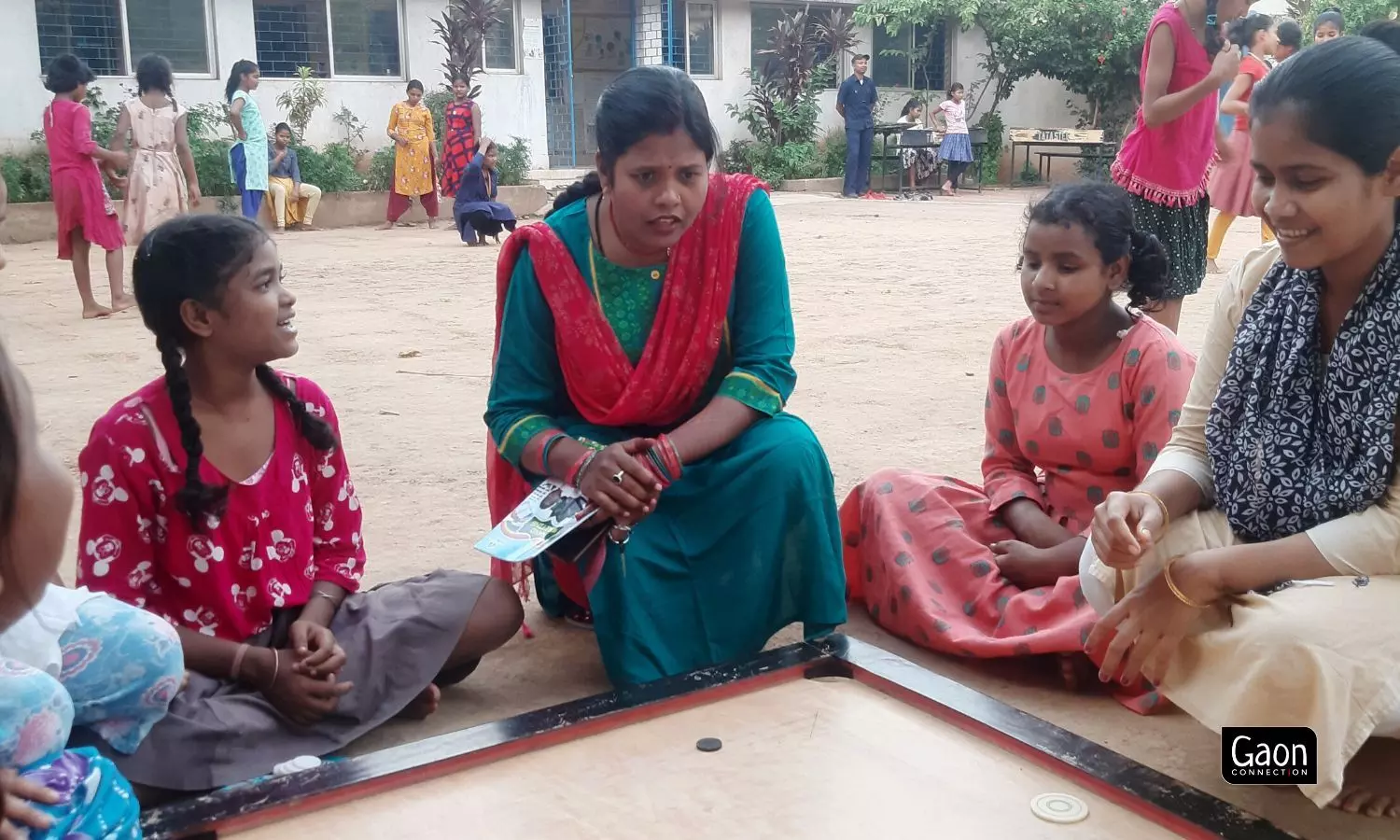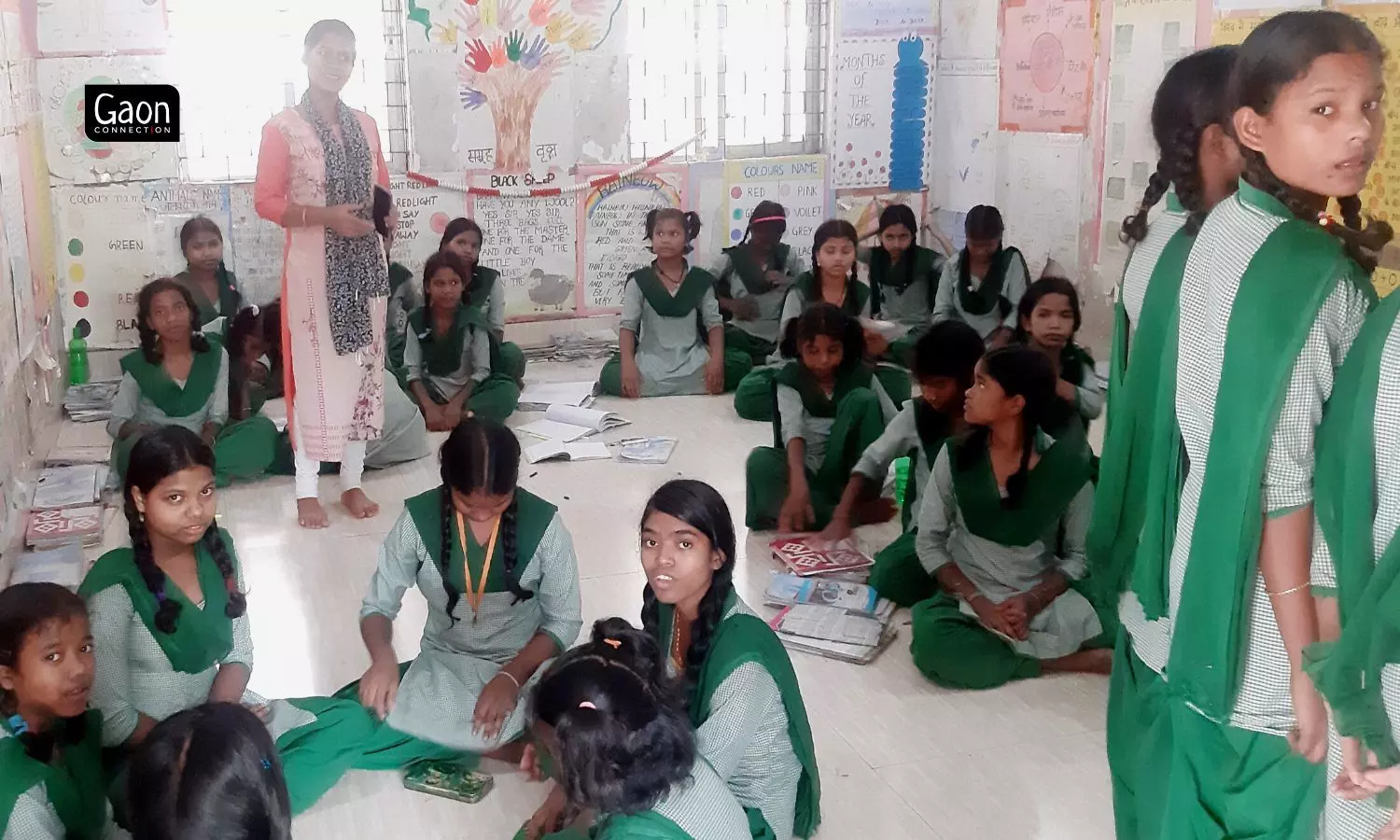Noamundi (West Singhbhum), Jharkhand
Richa Hembrom enters the blue gates of her school every day with a spring in her step. The 13-year-old girl from Ho tribal community aspires to become a medical doctor.
During the nationwide lockdown due to COVID pandemic, Richa dropped out of school when she was in class four of her primary school at Tatiba village in West Singhbhum district of Jharkhand. As she came from a family that could not afford to get her a smartphone for her online classes, she could not continue her studies. She stayed home, resigned to being a dropout.
But, the Camp School, a unique educational institution for drop-out girls from tribal communities, has rekindled her hopes and dreams of making it big in life.
The school, located in Noamundi village and run by a non-profit ASPIRE, provides coaching to students such as Richa so that they can make up for the learning loss they suffered academically when they had to drop out of school. It has a nine-month residential course, and Richa has already completed seven months. After the course she should be able to get admission at a government school.
“I had lost hope of completing school education after the lockdown but now I want to become a doctor,” Richa, told Gaon Connection.
The Camp School is silently changing the lives of girls from tribal communities by giving them a second shot at education.
Also Read: A Visually Impaired Teacher Illuminated The Lives Of Children Of Tea-Garden Workers
“Since its inception in 2005, the school has rehabilitated 1,300 school dropouts and restarted their educational journey,” Anjali Sulanki, ASPIRE’s staff at Noamundi, and an ex-teacher herself, told Gaon Connection. The nonprofit’s mission is to support poor rural students to complete school education.
The Camp School was established under the Jharkhand Shiksha Pariyojna (Jharkhand Education Project). It was run with the help of corporate social responsibility (CSR) funds provided by the mining industries in West Singhbhum district, which is one of the top districts in the country for iron ore mining. The non-profit ASPIRE took over the school in 2018.

The Camp School is silently changing the lives of girls from tribal communities by giving them a second shot at education.
Explaining how dropout students are identified, Sulanki said that ASPIRE has a gram panchayat community mobiliser in the area who identifies school dropouts and enables them to join the Camp School.
“Girls between the ages of nine and 14, who for some reason have not been able to continue their studies, who are orphans, or are children of single parents are taken into the Camp School,” she said.
The girls studying at the school are provided with free food, accommodation and reading material at the school, and are taught the syllabus of classes one to five, depending on each one’s age and learning capabilities.
“After they complete the nine months, they are admitted into the Kasturba Gandhi Balika Vidyalaya in Noamundi,” said Sulanki.
Every year around 100 girls are admitted to the school. Students who do not make it into the government schools are given another nine month’s training at the Camp School. There are five female teachers in all who conduct classes at the school.
Puja Hansda, from Baraiburu village had not got admission into the village school as she did not have proper papers, such as Aadhaar card, which the school required to admit her. “I started my lessons at the Camp School and I hope I will get admission at the regular school,” 12-year-old Hansda told Gaon Connection.
Also Read: Maharashtra: A Rural School Where Making Car Sensors and Rain Sensors Is Child’s Play
Friendly atmosphere for girls
“During classes, girls are divided into different groups to improve their self-confidence. The girls call their teachers didi [elder sister] and they all live together in the campus,” Nandini Behra, who is in charge of the Camp School, told Gaon Connection.

The Camp School was established under the Jharkhand Shiksha Pariyojna (Jharkhand Education Project).
“The teachers and students develop a special bond and we also ensure that the teachers are given regular training to upgrade their teaching skills,” said Behra.
According to her, teachers at the Camp School focus on girls’ learning skill, leadership qualities, and academics. The girls also participate in fun activities, she added.
The teachers ensure that they speak to the girls in their language or dialect. “Sometimes the language problem comes in the way of their learning,” Roshni Kandaiburu, another teacher at the Camp School, told Gaon Connection. “We talk to them in their language initially and then train them in Hindi,” she added.
For many children who were orphaned, the Camp School has been a blessing, said Sombari Kui, a resident of Noamundi Basti. “A decade ago, I provided a home to Tulsi and Sanjay Sinku, eight and two years old respectively, when they lost both their parents. Tulsi was admitted to the Camp School, after which she went to a regular school, and is now studying in class eight,” Sombari told Gaon Connection.
Students get a better life
Many of the students who have passed out of the Camp School are now doing well in life. Sarojni Nayak, an ex-student, is now a member of the West Singhbhum Zila Parishad while Rani Jerai is teaching in the same school.
“I dropped out of school when I was in class two. There were violent incidents of witch hunting in my village and I stayed home,” 24-year-old Jerai, a resident of Jirpai village in the Bhangaon panchayat, told Gaon Connection.
She completed training at the Camp School in 2008 and joined the Kasturba Gandhi Balika Vidyalaya in Noamundi. Thereafter, she went on to complete her graduation at Noamundi College after which she joined ASPIRE as a teaching staff and now teaches at the Camp School since 2022.




















